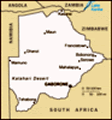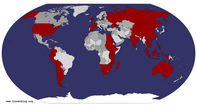Advertisement
Published: January 11th 2010
There's a crow-flies route from Kasane to Maun through Chobe National Park but the road is poor, so I find myself having to use Botswanan public transport to traverse the other two sides of this 300km equilateral triangle. We leave before 6AM, the fiery newly-risen sun a Stop sign for the passage of night. The leg to Nata has been described as "appalling" but this is by Western standards, not African ones, and the average speed of 80km/h that we achieve is essentially warp factor 3. For free, we see buffalo and the largest herd of elephant I've ever set eyes on. The child sitting opposite me regularly coughs with vigour in my direction, the spray of particles no doubt a cocktail of the swine flu and TB germs that posters in my Kasane hotel had been warning about. An almost Ethiopian love of closed windows ensures a warm environment for this epidemic to really take hold.
The bus station at Nata is a gas station that all passing buses by necessity stop in at. The onward bus to Maun doesn't show up for another 1.5 hours and is a 2-aisle-3 configuration, meaning even less breeze per square inch. We
pass some adult ostriches with an enormous flock of youngsters. But the heat is unwelcome and my MP3 player makes an appearance to pass the time.
Maun is hot but dry - my skin has been cracking since Vic Falls. But, as the most touristy spot in the country, it still doesn't possess an ATM that accepts Mastercard. I queue for 30 minutes in Barclays and eventually succeed in withdrawing money over the counter but Jeez - why does Africa keep trying to keep me apart from my money?
Maun is overcrowded with traffic - crossing the road actually requires concentration. Though the taxi drivers aren't aggressive in their attempts to solicit custom, their initial quotes are set in stone. I'm told by locals that P30 is the right price to my hostel but this cuts no ice with the guys who want 40 or 50. And as for the shared taxis that should cost P4, I think they just don't exist for tourists. However hitching is a safe and popular alternative in Botswana, and I use it to fill the gaps when public transport occasionally fails me.
My hostel is in an appealing setting next to
the Thamalakane River, whose waters stir a gentle breeze in the otherwise torpid air. I have a permanent tent, sadly occupied by a permanent population of mosquitoes who clearly dislike my presence. There's a distinct shortage of independent travellers and my main interactions are with the hostel's cat and two sheepdogs.
Maun confirms something I've read about but only half-believed, namely that independent backpackers aren't welcome in Botswana. My $60+ hotel room in Kasane was a clue but it's only when I start researching Okavango Delta
mokoro (dug-out canoe) trips that the realisation hits home. The Okavango Delta is the world's largest inland delta, the end point of the Okavango river and from which water moves on via evaporation or transpiration. It's a unique wetland environment rich in animal, bird, and plant life, and Botswana's top tourist attraction. In Madagascar, I'd paid ~$50 per day for a guide, a cook, a boatman, three full meals, park entry fees, and camping equipment. In Botswana, I'm expected to pay nearly $90 for a chap to pole me around with a packed lunch and no accommodation. And this is the budget end of the spectrum. Decent lodges generally fall in the $400-500
per day range and can only be reached via fly-in. I meet a charter flight pilot who opines that the Botswanan government is only interested in upmarket tourism, a view held by many.
This seems like another manifestation of the"mountain gorilla syndrome" - charge an absurd amount for something, an amount with no economic justification in that particular locale, and keep your fingers crossed that enough people are willing to pay it. However I've had enough amazing experiences on the cheap in my life that I'd rather blow my money on things that have a defensible price. As such, the Okavango Delta will be getting the bare minimum of my time, namely a day trip.
The day starts with a motorboat leg to the familiar-sounding village of Boro at the fringes of the Delta. A crowd of local people is waiting, including a large number of
mokoro polers all eager for custom. There's a guy in charge of allocating polers, and the ones he picks out come forward beaming. Since each
mokoro takes two passengers, and there's a group of 3 German girls also booked in for a day trip, I get tacked on to their group. My
poler is called N and wears a shirt with a Howard Johnson print. We push off at about 9:30AM. It's already roasting.
The Delta may well be a thing of wonder from all kinds of scientific points of view, but from a
mokoro riding low in the water it appears to consist of predominantly one thing - reeds. They're high enough to prevent any kind of panoramic views around, and unruly enough as to be constantly slapping in your face as the polers laboriously punt us through them. Where there's an occasional break in the reeds, we see lily pads quivering on the surface of the water. The insect population of the boat climbs as beetles are dislodged from their reeds as we push past.
Of course the polers miss out on this low-level fun and ironically have the best views of all of us. But they're also having to put in a good deal of physical exertion in a relentless sun. We've been going for less than two hours when we reach an island where we disembark for an early lunch. This is included in the price and consists of two sandwiches and an apple but nothing

 The old enemy
The old enemy
Old Bridge Backpackersto drink. For that, we're expected to make use of the free Delta water.
We do a very short "safari" on the island. It's explained to us that putting a glowing coal in some elephant dung will produce clouds of smoke that keep mossies away. No idea what it smells like, though. We see a few zebras but otherwise the wildlife haul is limited to several dopy dragonflies.
This is to be as far into the Delta as we will come, and after the safari we head back to Boro. We stop part way at one of the largest reed-free spots that we've seen, and dive in for a welcome swim. I ask N how much he's being paid for this work and he says P40 (i.e. $6). That's out of the P1210 (i.e. $182) that the German girl and I have paid for the day. One reason I'd booked this tour at my hostel was because they made great play of their connections with this particular collective of polers - clearly that relationship consists of gouging the guests and screwing the polers. Worse, with an excess of polers and currently a shortage of tourists, each poler is
only getting work maybe once per week.
Back at the hostel I mull over what has been an unsatisfactory day. Botswana has a reputation for being an African success story. Its wealth has been founded on diamonds and tourism, but that wealth is in the hands of a few. As I've seen today, the tourism wealth certainly isn't filtering down to the poorest elements of the population. The country is also touted as Africa's longest-running multiparty democracy, though the current ruling party has essentially been in power for the 40-odd years since independence so "multiparty democracy" has a hollow ring to it. HIV infection rates are amongst the highest in the world but the government does appear to be taking this issue seriously. On the plus side, Botswana is regarded as the least corrupt country in Africa, which is perhaps a more significant measure of its prospects for the future.
I have the good fortune to bump into an Aussie girl who has been travelling and working around the world for the last four years. She has just returned from an overnight trip to the Delta, in which she says she spent more time reading than either being
poled around or exploring the islands. She has reached a state of ennui that I recognise very clearly in myself - she even admits that she rarely talks to other travellers now because what's the point? Funnily enough, this meeting of two people with a similar mindset results in about six hours of chat. Plus she's the first person I've ever met who's competed in the X Games.
I'm due to move on from Maun, and I do so with a fillip from this chance encounter with a fellow long-term traveller.
Dull but possibly useful info i. If you don't have your own transport, the only options for getting to Windhoek direct from Maun are flying, the minibus company Tenna Express (charging N$1250 per person for a minimum of 2 people - yes, that's really expensive), or getting really lucky with a hitch. I saw a sign at Old Bridge Backpackers advertising a service up to the border that wasn't too expensive (I can't remember what the cost was but I couldn't make use of this service anyway because it wasn't due to start for another few days). Your remaining alternative is to bus it to Ghanzi then
hitch from there (see next blog).
Advertisement
Tot: 0.135s; Tpl: 0.013s; cc: 16; qc: 27; dbt: 0.0835s; 1; m:domysql w:travelblog (10.17.0.13); sld: 1;
; mem: 1.2mb






















Antoine
non-member comment
OKavango scam
We recently did an overnight mokoro trip and ended up with the same impressions as you... Bad thing is, we had forgotten our books back in Maun so I was a lot of sitting around doing nothing which seems to be a national sport in these parts of the world. It's sadly a scam in which both the tourists and the polers get screwed. Your blog is as useful as it is hilarious. Thanks for sharing!